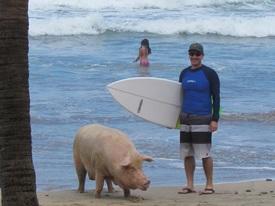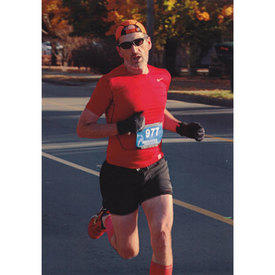Back to back halfs then 26.2?

RunFarLiveHappy
Posts: 805 Member
Hello. I've been lurking in the group awhile, I comment occasionally, but haven't really ever posted an introduction. My name is Nicholette. I'm 32 and have been running since June 2012. I've been really running consistently and competitively since March 2013.
I have registered to run back to back half marathons on April 6 and April 13. I am not concerned about this aspect of my post at all. Would it be awesome to PR both of them? Obviously, but not necessarily make or break. My plan was to run the first half fairly conservatively because it's known as the fastest half in Colorado (the Platte River half) as it is mostly flat and downhill (starting elevation 5335, finish elevation 5252, highest elevation 5340 and lowest elevation 5203) so I'm fairly certain I can PR. I will run the second half marathon (Prairie Dog Spring Fling half) fairly aggressively, but it has a few significant climbs throughout so I won't be upset if I don't PR, but of course it would be awesome if I did.
Now we come to the tricky part and where I'm really looking for advice... I have been training for a full marathon really just to improve my half time because I don't have a specific full that I have registered for. A girl friend of mine is running one in May so her training plan has her running a 26.2 mile run on April 20 as her last/longest run prior to her full in mid May. She wants me to run it with her. Is it crazy to agree to run this "mini marathon"? I'm leaning toward doing it but there's one other obstacle... I also have the opportunity to run a fully assisted (timed, water/aid stations, port a johns, etc) 20-miler on April 26. I have been on the fence about registering for a full marathon for a few weeks. On one hand completing a 26.2 mile run would obviously be "proof" that I can do it. On the other hand the 20-miler event with my run club would also simulate a more accurate race environment even though its not the full marathon distance... I would like to support my friend and run with her, but don't want to sacrifice my own training or potentially risk injury doing too much in too short a time.
A little more back ground...
I started tracking my runs on January 1st because I made a goal to run 2014 miles in 2014. Link for spreadsheet if you're interested:
https://docs.google.com/spreadsheet/ccc?key=0AmI3QR0Pm1YgdHI1UTBxbEFhLS1kZnZSUFlYbVNqWFE#gid=0
Weekly mileage since Jan 1; 21.5, 30.5, 23.5, 39.5, 43.25, 37.25
Long runs since Jan 1; 7, 20, half marathon race, 10, 14.5, 10, 20
HM/long run history: I've been running halfs since Sept 2013, I've run 3 of them & PR'd each time. I have run a double digit long run most weeks for the last 6 months. In addition to the two halfs in April I am registered for 2 others (June, September).
When I have run my two 20-mile training runs I have "mostly" recovered fairly well and fairly quickly. I'm of the mind that recovery happens more efficiently if I run early and often so I don't stiffen up. I usually run several shorter runs starting the first day or two afterwards.
So basically I've tried to include any pertinent info. without making it too much of a TLDR post. What are your thoughts/concerns/advice about my schedule and trying to fit everything in?? Thanks in advance!!
I have registered to run back to back half marathons on April 6 and April 13. I am not concerned about this aspect of my post at all. Would it be awesome to PR both of them? Obviously, but not necessarily make or break. My plan was to run the first half fairly conservatively because it's known as the fastest half in Colorado (the Platte River half) as it is mostly flat and downhill (starting elevation 5335, finish elevation 5252, highest elevation 5340 and lowest elevation 5203) so I'm fairly certain I can PR. I will run the second half marathon (Prairie Dog Spring Fling half) fairly aggressively, but it has a few significant climbs throughout so I won't be upset if I don't PR, but of course it would be awesome if I did.
Now we come to the tricky part and where I'm really looking for advice... I have been training for a full marathon really just to improve my half time because I don't have a specific full that I have registered for. A girl friend of mine is running one in May so her training plan has her running a 26.2 mile run on April 20 as her last/longest run prior to her full in mid May. She wants me to run it with her. Is it crazy to agree to run this "mini marathon"? I'm leaning toward doing it but there's one other obstacle... I also have the opportunity to run a fully assisted (timed, water/aid stations, port a johns, etc) 20-miler on April 26. I have been on the fence about registering for a full marathon for a few weeks. On one hand completing a 26.2 mile run would obviously be "proof" that I can do it. On the other hand the 20-miler event with my run club would also simulate a more accurate race environment even though its not the full marathon distance... I would like to support my friend and run with her, but don't want to sacrifice my own training or potentially risk injury doing too much in too short a time.
A little more back ground...
I started tracking my runs on January 1st because I made a goal to run 2014 miles in 2014. Link for spreadsheet if you're interested:
https://docs.google.com/spreadsheet/ccc?key=0AmI3QR0Pm1YgdHI1UTBxbEFhLS1kZnZSUFlYbVNqWFE#gid=0
Weekly mileage since Jan 1; 21.5, 30.5, 23.5, 39.5, 43.25, 37.25
Long runs since Jan 1; 7, 20, half marathon race, 10, 14.5, 10, 20
HM/long run history: I've been running halfs since Sept 2013, I've run 3 of them & PR'd each time. I have run a double digit long run most weeks for the last 6 months. In addition to the two halfs in April I am registered for 2 others (June, September).
When I have run my two 20-mile training runs I have "mostly" recovered fairly well and fairly quickly. I'm of the mind that recovery happens more efficiently if I run early and often so I don't stiffen up. I usually run several shorter runs starting the first day or two afterwards.
So basically I've tried to include any pertinent info. without making it too much of a TLDR post. What are your thoughts/concerns/advice about my schedule and trying to fit everything in?? Thanks in advance!!
0
Replies
-
That's not back to back. Running a half on the 5th and 6th is back to back.I have registered to run back to back half marathons on April 6 and April 13.
I would throw that training plan away, there is no need to run that far for marathon prep.A girl friend of mine is running one in May so her training plan has her running a 26.2 mile run on April 20 as her last/longest run prior to her full in mid May.I also have the opportunity to run a fully assisted (timed, water/aid stations, port a johns, etc) 20-miler on April 26. I have been on the fence about registering for a full marathon for a few weeks. On one hand completing a 26.2 mile run would obviously be "proof" that I can do it. On the other hand the 20-miler event with my run club would also simulate a more accurate race environment even though its not the full marathon distance... I would like to support my friend and run with her, but don't want to sacrifice my own training or potentially risk injury doing too much in too short a time.
A better plan would be to have your friend do this 20 mile training run with you and your club. 20 miles a month out will be perfect for her long run and having it supported will help, especially if this is her first marathon.0 -
I can't quite follow it all (got a little confused between marathon, mini-marathon and 20 mile supported club run).
Longer long runs will help your halfs for sure. But 20s are probably overkill in the half realm (16ish will do just fine and is easier to recover from). When you get into marathon training, you need to be able to throw those 20s and not miss a beat with the rest of your training for the upcoming week. Nothing wrong with a recovery run or two, but you need to be able get quality runs in (speed or hills) by mid week.
A far as your two halfs a week apart, I'd say hammer the faster course and use the other one as an easy/recovery run. If you PR both, you went way too easy at the first one (which I think is the faster course?).
Now I think I see the question. I think a 26 mile training run is a little too far for most first timers. It's just too hard to recover. I think most runners are probably better served by capping it at ~ 22 - 23. You will likely end up "marathon trashed" as a result for running 26, which will ruin your training for the week (and then some perhaps).
So I vote for 20 mile training run over 26 mile run.
Good luck!0 -
That's not back to back. Running a half on the 5th and 6th is back to back.I have registered to run back to back half marathons on April 6 and April 13.
I would throw that training plan away, there is no need to run that far for marathon prep.A girl friend of mine is running one in May so her training plan has her running a 26.2 mile run on April 20 as her last/longest run prior to her full in mid May.I also have the opportunity to run a fully assisted (timed, water/aid stations, port a johns, etc) 20-miler on April 26. I have been on the fence about registering for a full marathon for a few weeks. On one hand completing a 26.2 mile run would obviously be "proof" that I can do it. On the other hand the 20-miler event with my run club would also simulate a more accurate race environment even though its not the full marathon distance... I would like to support my friend and run with her, but don't want to sacrifice my own training or potentially risk injury doing too much in too short a time.
A better plan would be to have your friend do this 20 mile training run with you and your club. 20 miles a month out will be perfect for her long run and having it supported will help, especially if this is her first marathon.
I agree with all of this. There is no need to run 26.2 in training. 20 is plenty.0 -
I agree with all of this. There is no need to run 26.2 in training. 20 is plenty.
Just to give you some context for this, the reason is that once you go over 20 miles, you are just taking too much out of your body and recovery will take several weeks. Some elite runners get away with 24- and 25-mile training runs, but they are only running for maybe 2.5 hours when they do this so it doesn't take nearly as much out of them. For the average runner, who is going to be out there for 4+ hours, running 26.2 in training is a bad idea.0 -
Genuinely appreciating all the feedback.
@DavidMartinez I guess you can penalize me for using the term "back to back" if you wish though I don't know how constructive it is? Let me correct the phrasing I chose by saying "I am running half marathons on back to back weekends" I appreciate your quick response but feel like you might have expanded your thoughts with more information.
@arc918 I had considered just running all out on the first half marathon (which yes, is the faster course) so I thank you for the recommendation. Sorry if I gave too much information or presented it in a confusing manner. Often I read comments where other members are potentially offering advice but have to continually ask for more information to make an educated recommendation. Thanks for the thoroughness in your thoughts.
@carsonruns what if one feels less than confident about completing 26.2 after only completing 20 in training? Sincere concern for first timers hearing horror stories or worse yet, virtually watching (through race updates) their friends "hit the wall"...
@davemunger it takes me 4 hours to run 20 miles so I absolutely appreciate the context and explanation.0 -
With marathon training it's a fine line with the long runs. You need to be able to recover and keep your training going along. When you get up past the low 20s that gets much tougher for most runners.
For a newbie, I would focus on more long runs rather than longer long runs. That said, if you are feeling great at the end of 20 (yeah, right) then feel free to tack on an extra mile or two.
One race day, you'll arrive at the line well rested from your taper. That will be enough to get you across the finish line.
The real trick on race day is to NOT go out too fast. It is easy to feel great at miles 3 & 8 & 11 & 15. But you need to manage your energy so the wheels don't fall off at mile 22.0 -
With marathon training it's a fine line with the long runs. You need to be able to recover and keep your training going along. When you get up past the low 20s that gets much tougher for most runners.
For a newbie, I would focus on more long runs rather than longer long runs. That said, if you are feeling great at the end of 20 (yeah, right) then feel free to tack on an extra mile or two.
One race day, you'll arrive at the line well rested from your taper. That will be enough to get you across the finish line.
The real trick on race day is to NOT go out too fast. It is easy to feel great at miles 3 & 8 & 11 & 15. But you need to manage your energy so the wheels don't fall off at mile 22.
I definitely enthusiastically agree re: not going out too fast. I made this mistake on my first half and it will not ever happen again. So far I have been keeping either an even pace or a negative split pace (with little deviation) on my long runs. Thanks again for the insight and helpful info.0 -
@carsonruns what if one feels less than confident about completing 26.2 after only completing 20 in training? Sincere concern for first timers hearing horror stories or worse yet, virtually watching (through race updates) their friends "hit the wall"...
Nearly every first time marathoner is going to hit the wall. It takes years of consistent mileage to build an aerobic base that will allow you to race a marathon without hitting that wall. It's inevitable. I ran my first marathon 6 years after I started running and I hit the wall at mile 19. It happens. The next year, after another 12 months of consistent mileage (45+ miles per week average), I didn't hit the wall. I ran pretty much the same race plan.
That being said, running 26 in training will actually set you up to be less fit. If you do 26 for a long run, it will really take 2 to 3 weeks for the body to fully recover. That means you shouldn't do 18 the next week and then 17 the following week, so you miss out on two long runs by doing one long run of 26. Better to do 18, 20, 16 over those three weeks and get the adaptations that come from the long run.
ETA:
For clarification for those who aren't sure what "hitting the wall" actually is. This is when the body runs out of glycogen stores to fuel the activity. The way we train for this is through the long runs. Those runs that last 90 minutes or longer are where the adaptation to use higher percentages of fat stores take place. First time marathoners, or those that don't consistently do 90+ minute runs when not specifically training for a marathon, will not have developed the ability to use the higher percentage of fat for fuel and will burn glycogen more quickly, therefore bringing on the phenomena of "hitting the wall".0 -
With marathon training it's a fine line with the long runs. You need to be able to recover and keep your training going along. When you get up past the low 20s that gets much tougher for most runners.
For a newbie, I would focus on more long runs rather than longer long runs. That said, if you are feeling great at the end of 20 (yeah, right) then feel free to tack on an extra mile or two.
One race day, you'll arrive at the line well rested from your taper. That will be enough to get you across the finish line.
The real trick on race day is to NOT go out too fast. It is easy to feel great at miles 3 & 8 & 11 & 15. But you need to manage your energy so the wheels don't fall off at mile 22.
While not as experienced as ARC & Carson, I fully agree with thier advice. I've only done 2 marathons and running longer than 20-22 miles does not prepare you any better for the race.0 -
So..a question along this line. I run a lot of half distances. This week I am in between two Half Marathon races and I seem to recover well on 1 to 2 days rest. My marathon isn't until June. It's technically like a first time marathoner as I have only run one and it was 10 years ago. I have a 26 mile run scheduled for 5 weeks out which I thought would be lots of time to recover (at very easy pace). The next week I would have no long run and then 3 weeks out about 12 miles (as the long run) and then taper.
Are you saying I shouldn't do that 26 miler? I too am mentally looking to know that I can actually cover this distance with some confidence. Thanks for the advice!0 -
So..a question along this line. I run a lot of half distances. This week I am in between two Half Marathon races and I seem to recover well on 1 to 2 days rest. My marathon isn't until June. It's technically like a first time marathoner as I have only run one and it was 10 years ago. I have a 26 mile run scheduled for 5 weeks out which I thought would be lots of time to recover (at very easy pace). The next week I would have no long run and then 3 weeks out about 12 miles (as the long run) and then taper.
Are you saying I shouldn't do that 26 miler? I too am mentally looking to know that I can actually cover this distance with some confidence. Thanks for the advice!
Yes. I would not do the 26 mile training run. 20 to 22 tops.0 -
I wouldn't do the 26 miles run.
I'd run a 20 @ 5 weeks, 12 @ 4 Weeks, another 18-20 @ 3 weeks and then taper.0 -
So..a question along this line. I run a lot of half distances. This week I am in between two Half Marathon races and I seem to recover well on 1 to 2 days rest. My marathon isn't until June. It's technically like a first time marathoner as I have only run one and it was 10 years ago. I have a 26 mile run scheduled for 5 weeks out which I thought would be lots of time to recover (at very easy pace). The next week I would have no long run and then 3 weeks out about 12 miles (as the long run) and then taper.
Are you saying I shouldn't do that 26 miler? I too am mentally looking to know that I can actually cover this distance with some confidence. Thanks for the advice!
I understand your need for confidence. I have been there and tried that. A couple years ago I paced a friend on a marathon about 4 weeks out from a target marathon. I thought it would give me confidence to run my target race, and since I'd be going about 1.5 minutes per mile slower, I didn't think it would take too much out of me. I was wrong -- I didn't fully recover before the target race and I bonked in that race.
I would suggest searching elsewhere for confidence. Run a half marathon, say, 2 months before your target race. You should be able to run the half at least 30 seconds per mile faster than the marathon. If you can do that, a marathon won't be so hard!
Or run the last 6-8 miles of a long run at marathon pace. if you can run marathon pace when you are tired after running 10+ miles, you can do the marathon. If that's too easy for you, throw a couple 5-minute tempos in the middle of the long run in addition to the marathon pace sections. Or do your long run the day after a 5K race. Any of these things can show you that you can put in long miles when you are already tired, which should give you the confidence you need for race day.0 -
So..a question along this line. I run a lot of half distances. This week I am in between two Half Marathon races and I seem to recover well on 1 to 2 days rest. My marathon isn't until June. It's technically like a first time marathoner as I have only run one and it was 10 years ago. I have a 26 mile run scheduled for 5 weeks out which I thought would be lots of time to recover (at very easy pace). The next week I would have no long run and then 3 weeks out about 12 miles (as the long run) and then taper.
Are you saying I shouldn't do that 26 miler? I too am mentally looking to know that I can actually cover this distance with some confidence. Thanks for the advice!
I understand your need for confidence. I have been there and tried that. A couple years ago I paced a friend on a marathon about 4 weeks out from a target marathon. I thought it would give me confidence to run my target race, and since I'd be going about 1.5 minutes per mile slower, I didn't think it would take too much out of me. I was wrong -- I didn't fully recover before the target race and I bonked in that race.
I would suggest searching elsewhere for confidence. Run a half marathon, say, 2 months before your target race. You should be able to run the half at least 30 seconds per mile faster than the marathon. If you can do that, a marathon won't be so hard!
Or run the last 6-8 miles of a long run at marathon pace. if you can run marathon pace when you are tired after running 10+ miles, you can do the marathon. If that's too easy for you, throw a couple 5-minute tempos in the middle of the long run in addition to the marathon pace sections. Or do your long run the day after a 5K race. Any of these things can show you that you can put in long miles when you are already tired, which should give you the confidence you need for race day.
This is solid advice. During training for my marathon I did 3 20 mile runs, with 2 of them being "fast finishes", the last 5 miles at marathon pace. I also did my 20 milers the day after running 10 miles at race pace. These gave me confidence and while challenging didn't take more than a couple days to recover from.0 -
Thanks again (especially to Carson & Dave) for even further explanation in detail of why a 26 mile run isn't really the best option. I also appreciate the suggestions for gaining more confidence going into a full. Before I checked this I had notified my friend that I wouldn't be running with her. I will definitely be running the 20-miler the following weekend if I'm feeling okay, which I suspect I will be. Good luck @HappyRunner and thanks for sharing your experience @ZeninTexas.
I'm also going to take the previous advice about running longer runs more often. If I stick to 16+ distances I think I can run 3-4 in two weeks instead of just once/week. Most important to me is improving my half performance. Though I only PR'd by 27 seconds in January it was great to see my 12th and 13th mile as my fastest miles. Obviously running more is working! Thanks again everyone!0 -
Most important to me is improving my half performance. Though I only PR'd by 27 seconds in January it was great to see my 12th and 13th mile as my fastest miles. Obviously running more is working! Thanks again everyone!
The best thing that I ever did for my HM performance was train for a marathon. 0
0 -
Thanks for the advice....still considering...the one marathon I did 10 years ago - I only ran up to 20-21 miles for long runs and at mile 22 is exactly where I bonked, hard - and the race was over. So that's a big mental block for me to overcome and the only way I can think of doing that is to know inside that I can cover this distance without bonking.
Just fyi - when I talk about the 26 mile run 5 weeks out.. my pace would be about 30 seconds slower per km than target marathon pace. All your collective advice makes physiological sense to me; and I know the mental is a big part of my running...tough one.
As I mentioned..doing lots of Half Races now and feeling good. I have a 30km race at the very end of March as well (2 months out from Marathon day)0 -
@lilbeesmommy - Sorry, by the way, didn't mean to grab your thread - just love learning about all this
 0
0 -
@lilbeesmommy - Sorry, by the way, didn't mean to grab your thread - just love learning about all this

Yeah way to hijack!! *pout pout* lol. It's totally fine. ????????0 -
With marathon training it's a fine line with the long runs. You need to be able to recover and keep your training going along. When you get up past the low 20s that gets much tougher for most runners.
For a newbie, I would focus on more long runs rather than longer long runs. That said, if you are feeling great at the end of 20 (yeah, right) then feel free to tack on an extra mile or two.
One race day, you'll arrive at the line well rested from your taper. That will be enough to get you across the finish line.
The real trick on race day is to NOT go out too fast. It is easy to feel great at miles 3 & 8 & 11 & 15. But you need to manage your energy so the wheels don't fall off at mile 22.
While not as experienced as ARC & Carson, I fully agree with thier advice. I've only done 2 marathons and running longer than 20-22 miles does not prepare you any better for the race.
One thing that has struck me in contemplating running a marathon (I may never do that) is why people still hit the wall when we've had energy gels for almost 40 years. How does that happen when I can ingest enough carbohydrates that I do not deplete my intramuscular glycogen before completing 26.2?
The other issue - is there actually any evidence that we can train our body to use fat? This would seem to be difficult to determine because of cost - who would fund research into a large enough body of runners, some of whom must be in the control group to be valid. What's the incentive to pay all that money to conduct the study unless there is something to sell?
Lacking that, how could a runner know that they are increasing the amount of fat that they use if they cut their training runs off at about 20 miles? (I have over a years worth of data that shows how my body uses fat versus glycogen while running but I have no way of knowing if it's changing because of how I'm training versus how it could be changing by training a different way. Remember "an experiment of one" is shorthand for something that is completely unscientific.)
Finally, in reading "the literature", I don't see proscriptions against running over 20 miles. It seems that between runnersconnect.net, Anderson's book, etc. the issue is not mileage but those sources state that there is little additional training effect when running over two hours.0 -
One thing that has struck me in contemplating running a marathon (I may never do that) is why people still hit the wall when we've had energy gels for almost 40 years. How does that happen when I can ingest enough carbohydrates that I do not deplete my intramuscular glycogen before completing 26.2?
My own experience is that if your glycogen stores aren't high enough before you start the race, you aren't going to be able to make if up with gels. I did two 20 mile training runs before my full marathon. Before the first one, I made sure I carb-loaded properly and I felt great at the end of the run. I got a little too self-sure for the second run and didn't carb load and I hit the wall hard. I believe that the body can only abosorb about 250 calories per hour while you are running which is far less than you are burning, so if you aren't fueled right to begin with you can't catch up. I think the average person has enough glycogen to get about 20 miles (with seasoned marathoners able to store more).
Edited to add: for info about training your body to use fat more efficiently while running look up "fasted training". I've never tried it so I hesitate to elaborate on it here.0 -
thanks for all the info in this thread everyone. very informative!0
This discussion has been closed.









